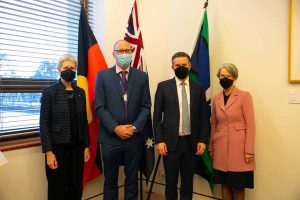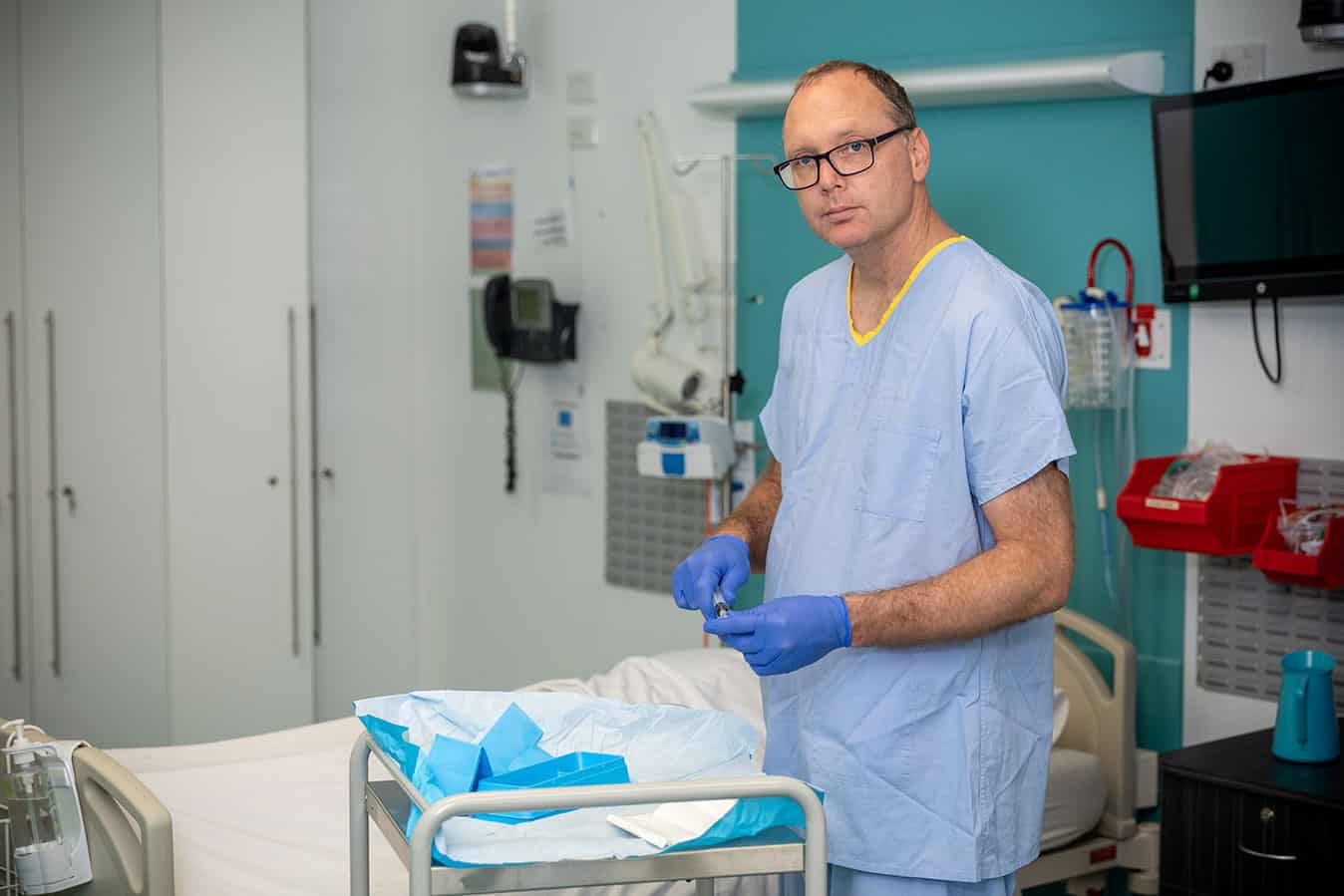One in 10 patients across Australian hospitals develops an infection during their stay. A major burden, on both patients and the healthcare system, this equates to about 165,000 such infections each year.
For the past decade, nurse Brett Mitchell, Professor Health Services Research and Nursing at Avondale University in NSW, has been investigating ways to prevent some of the most common healthcare associated infections by implementing evidence-based practical interventions.
“My ultimate goal is to improve patient safety and reduce complications in hospital,” he says.
“Every time we go to hospitals there’s a risk of something else going wrong and if we can reduce that risk for patients it makes a massive difference, not only to those individuals, but also to health services.”
Last year, Professor Mitchell received a $1.5 million National Health and Medical Research Council (NHMRC) Investigator Grant to tackle three areas of infection prevention – non-ventilator hospital-acquired pneumonia, urinary tract infection, and hospital cleaning – to deliver evidence to inform guidelines, policy and clinical practice.
One of the most common complications of a hospital stay, about 60,000 people acquire pneumonia each year, says Professor Mitchell, meaning prevention is critical.
“A lot of that [prevention] is actually through nursing care and things like the provision of high-quality oral care,” he explains.
The prevention of urinary tract infection, most commonly associated with catheter use in hospitals and healthcare settings, is another key area of focus. Professor Mitchell says a lot of UTIs could also potentially be prevented through improved care.
“For example, thinking about things like do we need to clean the area before we insert a catheter with a certain type of antiseptic. What do we need to clean the area with post-catheterisation? How frequently do we need to do that? There’s really low quality evidence on all these things but they are really things that we do as nurses and midwives every day.”

Improved cleaning in healthcare is the third area Professor Mitchell is researching to gauge its impact on reducing the risk of infections from happening.
“It’s focusing on things nurses and midwives do. For example, does it matter if blood pressure cuffs are cleaned, or not cleaned, between patients? The same goes for stethoscopes and ECG machines, does it actually matter? And if it does matter, well try and show that it does, or it doesn’t
“If it doesn’t, fantastic, we don’t need to be worrying too much about these things. But if it does, then there’s evidence to support that we need to find better ways to try and get these things done. It doesn’t necessarily mean a nurse or a midwife doing it, it just means that there’s evidence that we need to make these changes.”
All of Professor Mitchell’s research, is analysed for cost effectiveness. Unfortunately, with healthcare services running on finite budgets and resources, some effective interventions are just too costly to implement.
Encouragingly though, Professor Mitchell’s valuable research led to him earlier this week becoming the first nurse to receive the 2022 Commonwealth Health Minister’s Award for Excellence in Health and Medical Research, awarded annually to the most outstanding recipient from last year’s round of NHMRC Investigator Grants.
Professor Mitchell, who accepted the award from Heath Minister Mark Butler at Parliament House on Tuesday, said he felt shocked and humbled by the honour.
“Ultimately, it’s the peers from disciplines outside of nursing who recognised this research and suggested that it was up there with the best,” he says.
“For me, it demonstrates that nurses, and this type of research, infection prevention, can really lead research projects.”
An internationally recognised researcher, Professor Mitchell completed his PhD at the Australian Catholic University in 2013. He was Professor in Nursing at The University of Newcastle School of Nursing and Midwifery and has been Professor of Health Services Research and Nursing at Avondale University since April this year.

His fascination with infection prevention traces back to work experience at the Ipswich Hospital in Queensland as a Year 10 high school student.
“I went to the microbiology lab there and spent about a week or so working there and it really grabbed me, this sort of idea of bugs and viruses and pathogens,” he recalls.
The interest reignited early into his nursing career when he began working as a senior nurse in a tertiary infectious diseases unit in the UK. The move provided a springboard to various roles in infectious disease and infection prevention throughout his clinical career.
Highlights include helping establish the Tasmanian Infection Prevention and Control Unit and supporting national initiatives with the Australian Commission on Safety and Quality in Health Care.
Professor Mitchell has also worked in low-income countries, volunteering in Cambodia, at the Angkor Children’s Hospital, and with the Department of Foreign Affairs and Trade in Papua New Guinea.
More recently, he stepped up to co-lead Victoria’s COVID-19 hotel-quarantine infection control response, post public inquiries.
“The role there was really making sure that COVID did not escape from hotel quarantine into the community,” Professor Mitchell says.
“There were a lot of recommendations that needed to be implemented post-public inquiries, and a lot of things that could be improved on top of that. During that time, and from that time onwards, we never had one breach out of hotel quarantine into the community, which I am pretty chuffed about.
Part of the role also included the repatriation of Afghanistan refugees, caught up in the Taliban’s takeover of the country.
“We had to manage that situation, and not just hotel quarantine, but needed to make sure that it was culturally sensitive and responsive. There were people who had the most horrific things happen to them in their life and we were able to do something to make their life just a little bit better.”
Professor Mitchell concedes that the COVID-19 pandemic exposed the lack of high-quality research to support aspects of infection prevention, particularly for nurses and midwives.
“There was a big discussion about droplet transmission, airborne transmission, and the types of PPE we should be using, and that’s an example of not having health-based research in that area,” he says.
“Having that sort of research that’s done with real patients, done by clinicians, was lacking. Understanding, how often people need to be fit-tested? What type of masks do healthcare workers prefer? All these types of really simple answers were not available to help inform decisions and procurement and a range of other things.”
However, the shortcomings now present an opportunity to plan for future pandemics and give greater support to the value of research.
Above all, Professor Mitchell remains driven to make a difference to patients and outcomes, change policy and practice, and help educate the next generation of nurses and midwives.
“The impact research can have is profound because, ultimately, if we’re talking about evidence-based practice, we need good research to inform what we do in our clinical care and for our patients,” says Professor Mitchell.
“Research also has the benefit of being able to inform how we teach our up-and-coming undergraduate students and also how we educate our existing workforce about changes in practice. Without research, we are going to be doing things that are outdated and aren’t contemporary, which means that potentially we’re not getting the best outcomes for our patients. For me, that’s the real value of research.”








